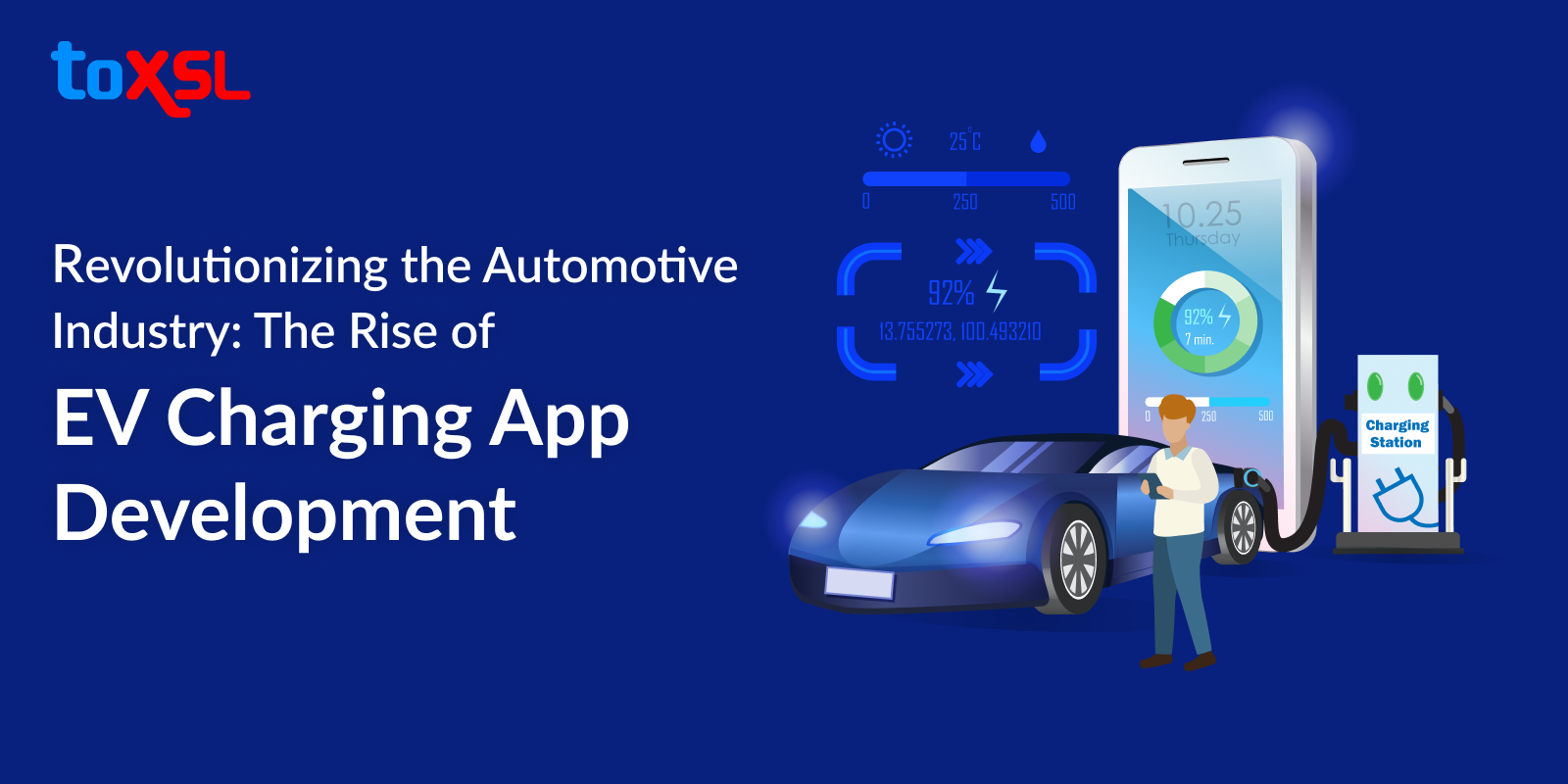- Apr 16, 2025
Share this post on:

The market for automobiles is expanding rapidly. Nowadays, electric vehicle (EV) adoption is rapidly increasing, and with it, the demand for efficient and accessible charging solutions. Moreover, governments around the globe are focusing on eco-friendly transportation solutions, giving more attention to EVs. According to marketsandmarkets, by 2027, the global EV charging app development market is expected to reach $76.9 billion at a CAGR of 45%.
By integrating technology with eco-friendly practices, automobile businesses are shifting towards sustainable transportation. Moreover, governments globally are supporting eco-friendly innovations, helping businesses pave the way for a more environmentally friendly and sophisticated future in transportation.
With all the growth in EVs, the need for EV charging apps is also growing. Hence, developing an EV charging app can be profitable for a mobile app development company, providing users with a convenient way to locate charging stations and manage their charging sessions. This blog post will explore the business model, the cost of EV charging app development, and how ToXSL Technologies can help you become part of this environment-friendly revolution.
EV Charging App Development: Business Models
Electric vehicles (EVs) are becoming increasingly popular as the world shifts towards more sustainable transportation options. With this rise in EV adoption, the demand for electric vehicle charging stations is also growing rapidly. As a result, various business models have emerged in the EV charging industry to meet the diverse needs of consumers, businesses, and governments. In this blog post, we will explore some of the key EV charging business models that are shaping the future of electric mobility.

1. Public Charging Networks
One of the most common EV charging business models that a mobile app development company prefers is the establishment of public charging networks. These networks consist of charging stations located in public places such as shopping centres, parking lots, and highways. Companies like ChargePoint, EVgo, and Electrify America operate public charging networks that allow EV drivers to charge their vehicles conveniently while they are out and about. Public charging networks often use a pay-per-use or subscription-based pricing model to generate revenue.
2. Workplace Charging Programs
Workplace charging programs involve installing EV charging stations at office buildings, corporate campuses, and other workplaces. Employers may offer free or subsidized charging to their employees as a perk to encourage EV adoption. Workplace charging programs not only support employee satisfaction but also contribute to reducing greenhouse gas emissions from commuting vehicles.
3. Residential Charging Solutions
Residential charging solutions cater to EV owners who prefer to charge their vehicles at home. Home charging stations can be installed in garages or driveways, providing convenient access to power for daily charging needs. Some utility companies offer special rates or incentives for residential customers who install home charging stations, encouraging more people to switch to electric vehicles.
4. Fleet Charging Services
Fleet charging services target businesses with large fleets of electric vehicles, such as taxi companies, delivery services, and public transportation agencies. These businesses require reliable and efficient charging solutions to keep their fleets operational. Fleet charging services may include on-site charging infrastructure management, billing services, and fleet optimization tools to maximize vehicle uptime and efficiency.
5. Integrated Energy Solutions
Integrated energy solutions combine EV charging with renewable energy sources, energy storage systems, and smart grid technologies to create a more sustainable and resilient energy ecosystem. By integrating EV charging infrastructure with solar panels, battery storage, and demand response capabilities, businesses can reduce their carbon footprint and energy costs while supporting grid stability.
EV Charging App Development: Boost Revenue with EV Charging
Electric Vehicle (EV) charging stations present a unique opportunity for businesses to boost revenue through various strategies. Here are some effective ways to maximize revenue with EV charging:
Implement Dynamic Pricing Strategies: Dynamic pricing involves adjusting the cost of charging based on factors such as demand, time of day, or electricity prices. By implementing dynamic pricing strategies, a software development company can optimize revenue by charging higher rates during peak hours or when demand is high. This approach not only maximizes revenue but also helps manage congestion at charging stations.
Offer Premium Charging Services: Providing premium charging services can attract customers willing to pay extra for added convenience or faster charging speeds. Offering amenities such as reserved parking spots, valet charging services, or premium membership programs can help increase revenue and enhance the overall customer experience.
Expand Network with Strategic Partnerships: Collaborating with strategic partners, such as other businesses, municipalities, or EV manufacturers, can help expand the reach of EV charging services and attract more customers. By strategically locating charging stations in high-traffic areas or partnering with popular destinations, businesses can increase revenue through increased usage and visibility.
Leverage Advertising and Sponsorship Opportunities: Another way to boost revenue with EV charging is by leveraging advertising and sponsorship opportunities. Businesses can partner with brands looking to target environmentally conscious consumers or promote their products and services to EV owners. By offering advertising space on charging stations or partnering for sponsored events, businesses can generate additional revenue streams.
EV Charging App Development: Cost Breakdown
In order to accurately predict the cost of developing an EV charging app in 2024, one must take into account various factors. The cost of basic app development may begin at approximately $15,000, encompassing essential functionalities and a straightforward user interface.
The cost of developing more complex applications with advanced functionalities, such as real-time tracking and secure payment integrations, typically ranges between $15,000 and $50,000. This price range can vary depending on the chosen platform, which can be either iOS, Android, or both.
Consequently, the cost of a well-planned EV Charging App Development project can range from $10,000 to over $100,000, depending on the specific requirements and objectives of the application.
Moreover, based on industry standards and market research, here is a rough breakdown of the cost range for developing an EV charging app:
1. Basic App: $10,000-$300,000
2. Medium Complexity App: $30,000-$50,000
3. High Complexity App: $50,000-$100,000
Factors Affecting the Cost of EV Charging App Development
Electric Vehicle (EV) charging apps have become essential tools for EV owners to locate, access, and pay for charging services conveniently. The cost of developing an EV charging appcan vary significantly based on several factors. Understanding these factors is crucial for businesses looking to invest in such applications.
App Features and Complexity
The complexity and range of features integrated into the EV charging app play a significant role in determining the development cost. Basic apps with essential functionalities like locating charging stations and processing payments will be less expensive compared to apps with advanced features such as real-time availability tracking, reservation systems, user profiles, and integration with smart charging infrastructure.
Platform Compatibility
The choice of platforms on which the EV charging app will be developed (iOS, Android, or both) can impact the overall cost. Developing a cross-platform application that works seamlessly on multiple devices may require more resources and time, thus increasing Mobile App Development Costs.
User Interface (UI) and User Experience (UX) Design
The design elements of an EV charging app, including UI/UX design, branding, graphics, and animations, contribute to the overall cost. A well-designed app that offers a seamless user experience may require more investment but it can attract and retain users effectively.
Integration with External Systems
Integrating the EV charging app with external systems such as payment gateways, mapping services, IoT devices for monitoring charging stations, and backend infrastructure can add to the development costs. The complexity of integration and the number of third-party services involved will impact the overall expenses.
Security and Compliance Requirements
Ensuring data security, privacy compliance, and adherence to industry regulations are critical aspects of EV charging app development. Implementing robust security measures and complying with standards like GDPR or PCIDSS can increase development costs but are essential for building trust among users.
Testing and Quality Assurance
Thorough testing and quality assurance processes are vital to delivering a reliable and bug-free EV charging app. The cost of testing activities, including functional testing, performance testing, security testing, and compatibility testing across devices and platforms, should be factored into the overall development budget.
Maintenance and Support
Post-launch maintenance, updates, bug fixes, feature enhancements, customer support services, and server maintenance are ongoing expenses associated with running an EV charging app. Planning for long-term maintenance costs is crucial for ensuring the app’s sustainability and user satisfaction.
Conclusion: Develop EV charging apps with ToXSL Technologies.
ToXSL Technologies, a leading software development company, specializes in developing cutting-edge EV charging applications customized to meet your specific requirements. As a top company in EV charging app development, we bring a unique combination of innovation and expertise to each project. Our team of developers and designers comprehends the unique requirements of the EV charging market.
We understand the significance of creating an aesthetically pleasing and modern mobile application. Our focus is on designing an app that not only attracts users but also reflects the values and brand identity of your EV charging business. By hiring our mobile developers, you can expect a visually stunning application that will captivate users and differentiate your enterprise from competitors.
FAQs
1. What is the role of EV charging apps in the automotive industry?
EV charging apps help users locate, reserve, and pay for electric vehicle charging stations. They enhance convenience, provide real-time updates on station availability, and allow for seamless payment integration, thus boosting the adoption of electric vehicles.
2. How do EV charging apps benefit users?
EV charging apps save time by helping users find the nearest available charging stations, track charging progress, and make payments. They also provide features like route planning, charging station reviews, and notifications for low battery, enhancing user experience.
3. What are the key features of an effective EV charging app?
Key features include real-time station availability, GPS navigation, secure payment gateways, user account management, charging history, and push notifications. An intuitive user interface and integration with multiple payment methods also improve user satisfaction.
4. How can businesses benefit from developing EV charging apps?
Businesses developing EV charging apps can capitalize on the growing electric vehicle market, attract environmentally conscious customers, and create new revenue streams. By offering an easy-to-use platform, they can build brand loyalty and gain a competitive edge in the green tech space.












